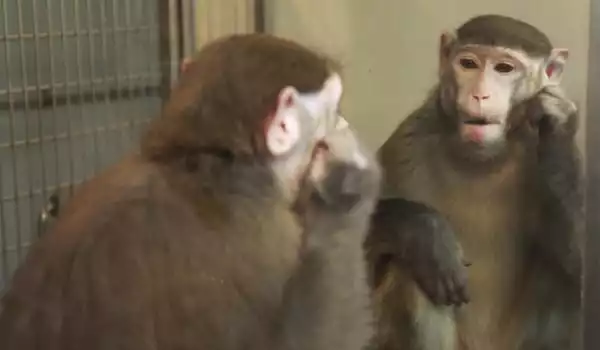Rhesus monkeys can adapt to a wide range of climates and environments. Their natural diet comprises of fruits, seeds, roots, plants, and insects, but in human-inhabited places, they also eat crops and look for food in waste. Rhesus monkeys live in groups comprising several adults of both sexes and they are young; males leave the colony when they reach maturity, whilst females tend to stay in the troop where they were born.
According to a new study from the California National Primate Research Center at the University of California, Davis, and Royal Holloway, University of London, rhesus macaques can perceive their own heartbeats. The study, published in the Proceedings of the National Academy of Sciences, develops the first-ever animal model of interoception. Interoception is the ability to detect changes in the internal state of one’s body, such as when one’s heart rate or breathing rate increases. Because interoception dysfunctions are linked to anxiety, depression, and Alzheimer’s disease, the findings present an important paradigm for future psychiatric and neuropsychiatric studies.
The rhesus monkey is a highly clever, active mammal that is placid when young but can become aggressive as an adult. It has also served as a valuable experimental animal in medical and psychological studies. The measurement of the Rh (from rhesus) factor in human blood requires a reaction with this monkey’s blood, and a rhesus was the first monkey to be propelled into the stratosphere. The Cercopithecidae family includes the rhesus monkey and other macaques.
Interoception is crucial for emotion regulation and mental health in adults, but we know very little about how it develops in early infancy or evolves through evolutionary time. The work presented here is a first successful attempt to fill these gaps.
Manos Tsakiris
The study is a collaboration between Eliza Bliss-Moreau, associate professor of psychology at UC Davis and core scientist at the CNPRC, and affective scientist Manos Tsakiris from the Department of Psychology at Royal Holloway, led by Joey Charbonneau, a doctoral student in psychology at UC Davis, and Lara Maister from Bangor University, Wales.
The researchers observed four rhesus monkeys as they sat in front of an infrared eye tracker, which displayed stimuli that bounced and emitted sounds that were either synchronous or asynchronous (faster and slower) with the monkeys heartbeats. Such an experiment takes advantage of the fact that monkeys and human newborns pay more attention to things that are surprising or unexpected to them.

All four monkeys spent more time looking at stimuli that were out of sync with their heartbeats than at stimuli that were in sync with their heartbeats, indicating that the out of sync stimuli was surprising based on the expected rhythm of their heartbeats. The findings are consistent with recent evidence obtained in human infants using a similar manner. This is the first behavioral evidence that rhesus monkeys have the ability to experience their heartbeats and have an interoceptive sense like humans.
“Why should we care? Interoception, or self-monitoring of your physiological systems, plays a role in all facets of human life “Bliss-Moreau said
The ability to detect our interior state can alert us to problems within the body that need to be addressed. Impaired interoceptive awareness is linked to a decreased ability to regulate emotions and an increased susceptibility to mental health problems such as anxiety and depression.
“Interoception is crucial for emotion regulation and mental health in adults, but we know very little about how it develops in early infancy or evolves through evolutionary time,” Tsakiris said. “The work presented here is a first successful attempt to fill these gaps.”
Deficits linked to Alzheimer’s disease
Interoception deficits have also been linked to neurodegenerative illnesses such as Alzheimer’s. “This model will be employed in future translational investigations of neurodegenerative disorders, such as Alzheimer’s,” stated Bliss-Moreau. “We can track interoception as a behavioral indicator of disease progression if we can measure it.”
The research sheds light on how the rhesus macaque model might be used to improve our understanding of brain and body function. “The next step will be to investigate the mechanism by which interoception may be involved in various mental and neuropsychiatric diseases,” Tsakiris stated.
















